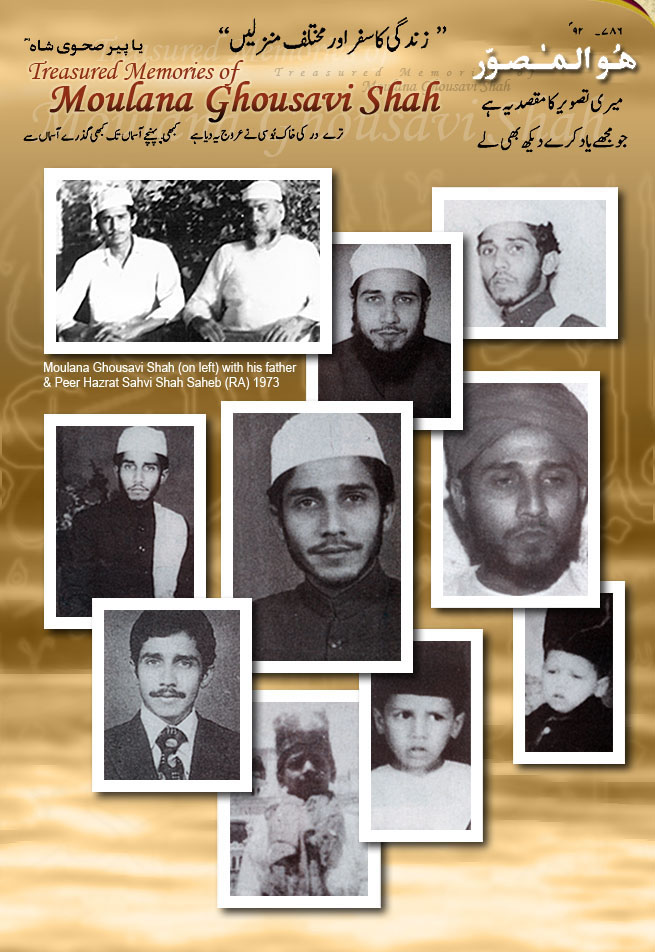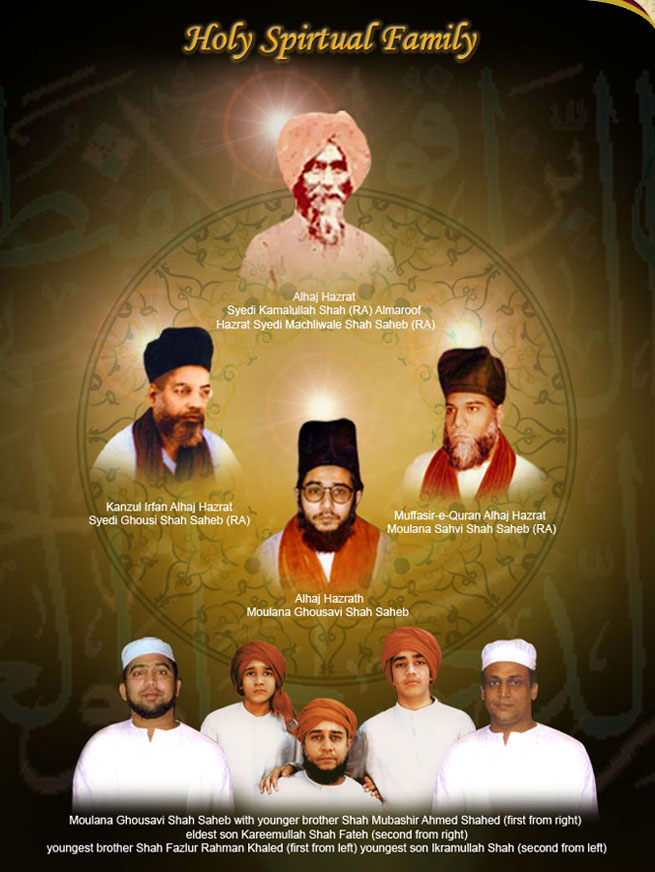About

Hyderabad has been the city of Sufis for hundreds of years. The great engineer, builder, administrator, Hazrath Hussain Shah Wali, built the bridge linking Hyderabad – Secunderabad, known as HUSSAIN SAGAR KA KATTA. Tanay Shah was the disciple of Hazrath Shah Raju Qattal. During the period of the last two Nizams, the city was the hub of Sufis, belonging to different orders. Hazrath MACHLIWALE SHAH was one of those saints who attracted professors, administrators, judges, collectors, poets and writers. Maharaj Kishen Pershad was always at his beck and call.
Hazrath Moulana Ghousavi Shah, belongs to the lineage. He is the grandson of Hazrath Ghousi Shah, the Khalifa of Hazrath Machliwale Shah. The order is known as KAMALIA, GHOUSIA, SAHVIA.
Hazrath Moulana Ghousavi Shah is the son of Hazrath Moulana Sahvi Shah. He was born sixty years ago in the city of Hyderabad. He studied the Holy Quran, and the traditions and learnt Persian, Arabic, English and Urdu under able masters. His father initiated him in Sulook (mysticism) thirty years ago, teaching him all the tenets. He instilled in him, a respect for all Sufi orders and thus he imbibed the virtues of tolerance.
Hundreds of disciples attracted to his father — a spiritual magnet. Hazrath Sahvi Shah, translated Quran and wrote many books of Tasawwuf and poetry. Hazrath Moulana Ghousavi Shah imbibed the love of learning from his father and engrossed himself in Tasawwuf and writing books. His Sunday DHIKR, attracts many of his disciples. DHIKR is followed by his explanation of the terminologies of Tasawwuf and disciples would be asked to give talks on mysticism. The Sunday school is a training ground for MURIDEEN
Hazrath Moulana Ghousavi Shah has great respect for Hazrath Imam Abu Hanifa. He observes his death anniversary annually. IBNE ARABI, who died in the year 1245 A.D. is the master of this order. Hazrath learnt FUSSOS-IL-HIKAM from his father and became an authority on WAHTADUL-WUJOOD. KHANKAH is part of his house and here the initiates dwell and practice the order.
Hazrath Moulana Ghousavi Shah, simplified the teachings of IBNE-ARABI, in consonance with the times. Disciples from Bellary, Bombay, Madras, Machilipatnam, frequently visit him for sufistic practices. The KHANKAH is known as BAITH-UN-NOOR. It is a spiritual retreat.
“NOOR(light) encompasses your mind, body and spirit when you practice DHIKR consistently with devotion. It is the repetition of the name of god. The light can be seen in your speech and movements. The eyes sparkle, reflect the vibrations of your heart. The heart-beats are transformed into spiritual beats, expelling all darkness” says he, lauding the virtues of DHIKR.
His disciples recite NAAT (poems in praise of the Prophet) MANQABAT (poems in praise of saints). He himself is a poet, though not as great as his father, who wrote number of books of poetry. The Qawwals find in those verses enough spiritual stuff and render them with great feeling. Hazrath Sahvi Shah wrote devotional Thumris also.
Hazrath Moulana Ghousavi Shah has a great sense of awareness; that makes him the champion of national integration and Hindu-Muslim Unity. The doors of his KHANKAH are open to members of all communities and Hindus come in large numbers to seek his blessings. In 1987, he organized a conference of world religions, which attracted delegates from many parts of the world. He was the Secretary General of the Conference. The conference received encomiums from the press and the people.

His disciples are totally devoted to him. He makes them at ease, as he talks to them. They feel so homely. The smiles that radiate from his face, makes them more comfortable. No light hearted comments, diminish their respect for him. He instills in them the spiritual message, with this strategy. He does not believe in using a rod.
He is a great lover of children. His little nephews and nieces, hog around him to collect chocolates, biscuits and ice-creams. Their presence is a great delight to him. He feels as fresh as a flower. Rightly has wordsworth said “Child is the Father of Man”.
He loves charity and hospitality is his weakness. The poor enjoy his charity and the rich BARKAT(blessings). When the bandh-mutthi (closed hand) opens. You cannot say ‘no’ to this. The mureed gratefully accepts. Hospitality is not confined to Machlipatnam, Bellary and Bombay walas. He who comes to him cannot go without “a loaf of bread” that is again a BARKAT – a blessing, in the form of food. BAITH-UN-NOOR is a place of physical and spiritual nutrition. Seeing his charity and hospitality, his murideen and his children have adopted these virtues and practise them.
He keeps his doors open to all the needy. He never resisted those, who launched a tirade against him; preferred to migrate, in consonance with the spirit of Islam. He would rather suffer in process, than ever complain.
The detractors nearly persecuted him, when he was re-building and renovating the mosque of his grandfather MASJID-E-KAREEMULLAH SHAH, whose Mutawwali, he was. His disciples stood like a rock with him – true Mujahids. Shahid, his younger brother was his pillar. Shahid finds in his elder brother a spiritual leader. The renovated mosque is a sheer piece of beauty.
It is a unique family, with all the members, welded together in total harmony and unity. This is the art of living. Living comes out of good living in practise. Though you may find these gems in books, unless you practise them, you cannot lead an ideal life. A sufi is one who practices all the best virtues of life and here is an ideal sufi and an ideal sufi family.
His murideen are soldiers of devotion and the devotion is amazing. You can see the devotion during the Urs celebrations of his order. He has great respect for ULEMAS and SUFIS of all disciples and orders.
All this is not exaggeration nor any attempt to boost up the image of a murshid. This is definitely an attempt to unfold the virtues of a man who is honest and transparent and inspires you to lead such a life.
